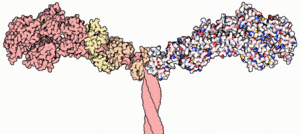Myosin facts for kids
Myosin is a special type of protein found in eukaryotic cells. It helps our muscles move and contract. Think of it like a tiny motor inside your body! Myosin needs energy to work, and it gets this energy from something called adenosine triphosphate (ATP). Scientists have found many different types of myosin proteins in living things.
Myosin works in a very similar way in almost all living creatures. For example, the myosin from a rabbit's muscle can even connect with a protein called actin from a tiny amoeba! This shows how important and basic myosin is for life.
How Myosin Works
The Parts of Myosin
Most myosin molecules have three main parts: a head, a neck, and a tail.
- The head part is like a tiny hand. It grabs onto another protein called actin. It uses energy from ATP to pull, which makes muscles shorter.
- The neck part acts like a lever. It helps the head move and pull.
- The tail part connects with other molecules or other myosin parts. Sometimes, the tail helps control how the myosin moves.
The Power Stroke
Many myosin molecules work together to make muscles shorter. They do this by using energy from ATP molecules. ATP is broken down into ADP and a phosphate group.
The "power stroke" happens when a phosphate is released from the myosin. This makes the myosin change its shape. It then pulls against the actin protein.
When the ADP molecule is released, a new ATP molecule attaches to the myosin head. This makes the myosin head let go of the actin. The myosin then breaks down the new ATP, and the cycle starts all over again. All these tiny power strokes working together make your muscles contract and move!
Images for kids
-
Myosin unrooted phylogenetic tree
See also
 In Spanish: Miosina para niños
In Spanish: Miosina para niños
 | May Edward Chinn |
 | Rebecca Cole |
 | Alexa Canady |
 | Dorothy Lavinia Brown |










